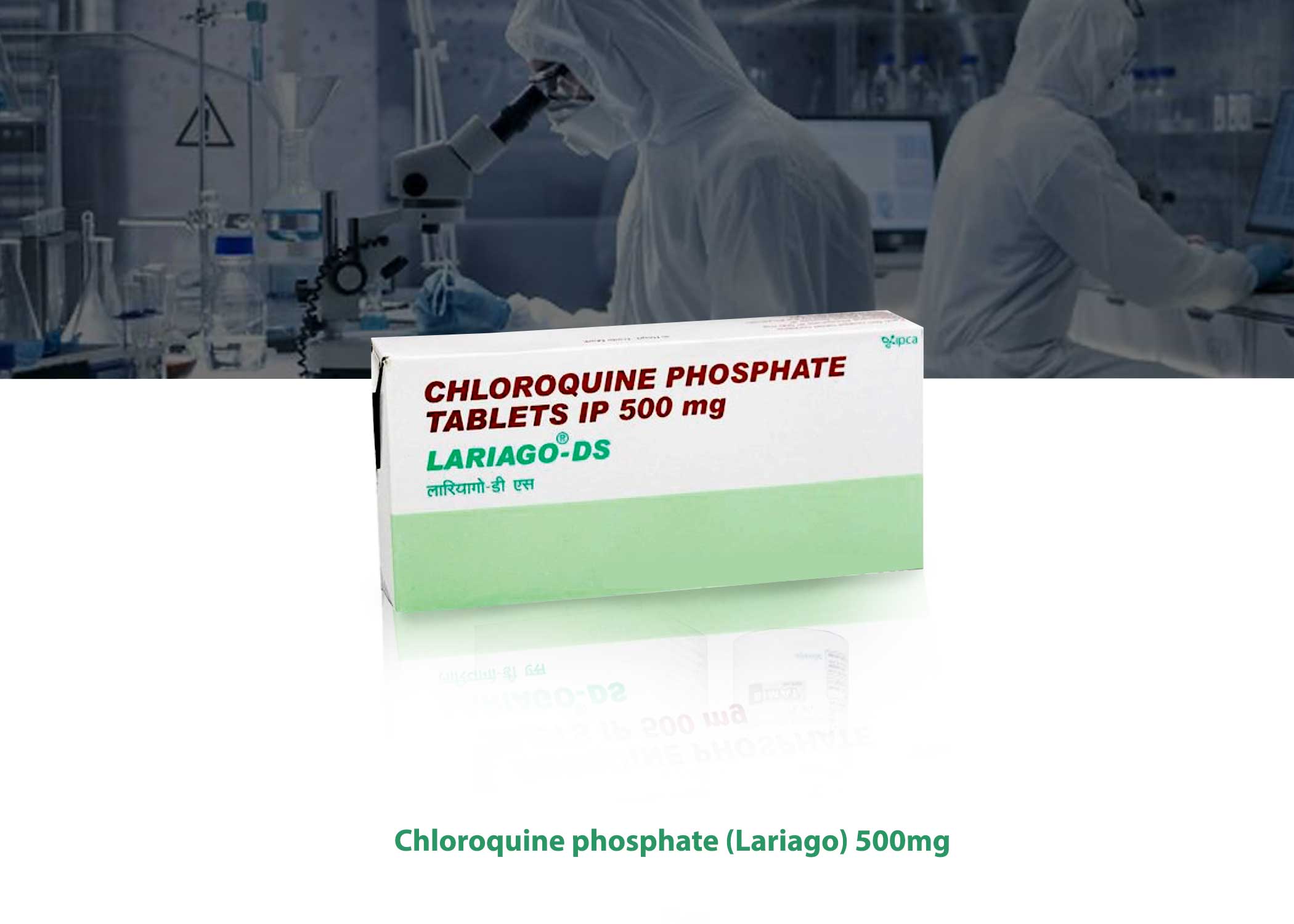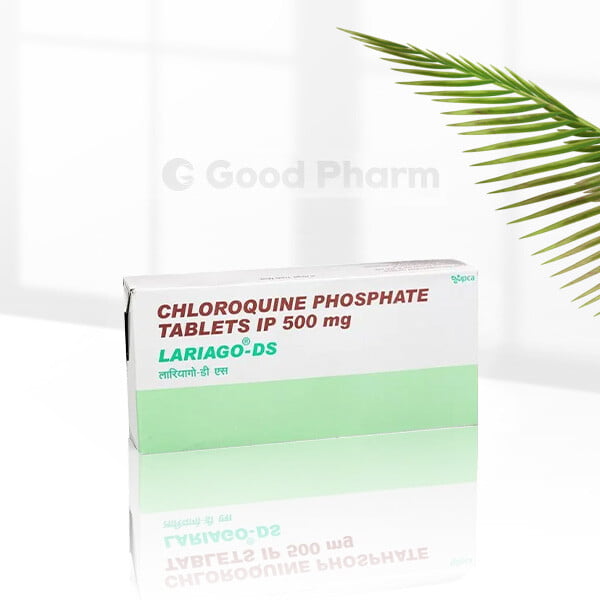- Your cart is empty
- Continue Shopping
Chloroquine phosphate (Lariago) 500 mg is an FDA-approved anti-parasitic medication used to prevent and treat non-falciparum malaria.
It is also used in the treatment of extra-intestinal amoebiasis, a parasitic infection caused by Entamoeba histolytica, particularly amoebic liver abscess.
Non-FDA-approved indications of chloroquine include the treatment of certain autoimmune diseases, such as rheumatoid arthritis and systemic lupus erythematosus. Also, current research suggests that chloroquine may be helpful as an antitumor medication for the treatment of cancer in association with chemotherapy and radiation.

What does Chloroquine (Lariago) 500mg contain?
This drug contains 500mg of chloroquine, an aminoquinolone drug, used in the prophylaxis and management of uncomplicated malaria in countries where chloroquine-sensitive malaria (P. ovale, P. vivax, and P. malariae) is present. These countries include Mexico, areas of Central America to the west of the Panama Canal, the Caribbean, East Asia, as well as some Middle Eastern countries. FDA also recommends chloroquine for the treatment of extraintestinal amebiasis. It is also used in inflammatory and rheumatological conditions, like rheumatoid arthritis and lupus.
How does Chloroquine (Lariago) 500mg work?
It exerts its antimalarial action by increasing and accumulating levels of heme, which is toxic to the parasite, killing the parasite and preventing the spread of infection. It functions as an anti-inflammatory by suppressing the immune system functions.
Who cannot take Chloroquine (Lariago) 500mg?
This drug is not suitable for everyone. It is not recommended if you have any of the following conditions:
- Allergic reaction to hydroxychloroquine/chloroquine or similar medicines, like quinolone and quinine
- Malaria infection that is resistant to chloroquine
- Blood condition porphyria
- Retinal or vision loss
How should you take Chloroquine (Lariago) 500mg?
Lariago should be taken at a dose as advised by your doctor. Dosage depends on the condition being treated. For children, dosing depends on their weight. You may view Additional Information tab for recommended doses.
Swallow the tablet whole. Do not crush, chew, or break it. It should be taken with food to decrease risk of stomach upset.
Lariago works best when you take it on a regular schedule. For example, if you are taking it once a week to prevent malaria, it is best to take it on the same day of each week.
Finish the full course of treatment. Stopping it early can result in treatment failure and increase the side effects too.
What if you miss a dose?
If you forget a dose, take it as soon as you remember. If it’s nearly time for your next dose, skip the missed dose and and take your next dose at the usual time. Do not take a double dose to make up for a missed dose.
What if you take too much?
Taking too much of the drug can cause problems. If you’ve taken more than your prescribed dose and you feel unwell, seek medical help immediately.
What are the side effects of Chloroquine (Lariago) 500mg?
Most side effects are mild and temporary. They go away as your body adjusts to the medicine. Some of the common side effects are:
- Headache, dizziness
- Nausea, vomiting
- Abdominal pain
- Loss of appetite
- Diarrhea
Although chloroquine has relatively few side effects when taken as prescribed, higher doses of chloroquine have been shown to have rare but severe adverse effects.
- Visual problems, usually inability to focus near and far objects
- Paranoia, hallucinations, suicidal ideation
- Rash and sensitivity to light
- Heart problems – chest pain/tightness, fast, pounding heartbeat, dilated neck veins, swelling of the face/feet
- Ringing or buzzing in the ears
- Muscle weakness
- Difficulty in speaking, drooling, loss of balance control, muscle jerking, or stiffness, shuffling walk, stiffness of the limbs, uncontrolled movements
What other precautions should be taken?
Children
There are no studies that limit the use of this drug in the pediatric population. However, children are more sensitive to the effects of this medicine than adults. Safety and efficacy of chloroquine to treat extraintestinal amebiasis have not been established in children.
Elderly
There are no age-specific contraindications for this drug in the geriatric population. However, elderly patients are more likely to have age-related kidney, liver, or heart problems, which may require caution and an adjustment in the dose for patients receiving this medicine.
Pregnancy
This drug is generally safe to use in all trimesters of pregnancy, but let your doctor know if you are pregnant or planning to conceive a child.
Breastfeeding
There are no adequate studies in women for determining infant risk when using this medication during breastfeeding. Weigh the potential benefits against the potential risks before taking this medication while breastfeeding.
Drug-Disease Interactions
Before taking this drug, tell your doctor if you have the following conditions. These health problems may affect how the drug works and severity of its side effects. Dose adjustments may be needed if you have any of the following:
- Skin condition psoriasis
- Blood disease
- Liver disease
- Kidney disease
- Epilepsy/seizure
- Myasthenia gravis
- Myasthenia gravis
Drug-Drug Interactions
It is important for your doctor to know what medicines you’re taking, including prescription/over-the-counter drugs, herbals, and other supplements so that appropriate dose adjustments and proper advice may be given.
The following drugs affect how chloroquine works and/or vice versa. Talk to your doctor.
- Phenylbutazone for back/spine problems
- Neostigmine, pyridostigmine for myasthenia gravis
- Cimetidine for stomach ulcers
- Amiodarone for heart problems
- Rabies vaccine
If you take antacids for indigestion, leave at least 4 hours between taking them and hydroxychloroquine as the former prevents the drug from being absorbed by the body.
Alcohol
Drinking moderate amounts of alcohol is unlikely to affect this medication.
Driving
This drug causes side effects that may hinder your ability to drive. Do not drive until they go away.
Diet and Lifestyle
To avoid getting bitten by mosquitoes outdoors and, in turn, prevent malaria:
- Wear the right clothing and covered clothing when outdoors.
- Apply insect repellent cream on spray on areas not covered by clothing.
- Sleep under insecticide-treated bed nets.
How should Chloroquine (Lariago) 500mg be stored?
Store the medicine in a closed container at room temperature, away from heat, moisture, and direct light. Keep out of the reach of children. Do not keep outdated medicine or medicine no longer needed. Ask your healthcare professional how you should dispose of any medicine you do not use.
Quick Tips
- If you will be taking this medicine for a long time, it is very important that your doctor check your progress at regular visits. This is to make sure that the infection is cleared up completely, and to allow your doctor to check for any unwanted effects. Your doctor may check your blood, urine, eyes, ears, and knee or ankle reflexes during or after using this medicine.
- If your symptoms do not improve within a few days, or if they become worse, check with your doctor.
What company produces Chloroquine (Lariago) 500mg?
| Ipca | CEO: Premchand Godha Founder: K.B. Mehla Dr. N.S. Tibrawala Founded: 1949 Headquarters: Mumbai, Maharashtra, India Number of employees: 12,000 Subsidiaries: Ramdev Chemicals Pvt. Ltd., Ipca Laboratories (UK) Limited, Tonira Pharma Ltd., Activa Pharmaceuticals, Bristol Pharma Australia Pty Ltd, Avik Pharmaceutical Ltd., IPCA Traditional Remedies Pvt. Ltd., IPCA Pharmaceuticals Ltd. SA de CV., Trophic Wellness Pvt. Ltd., Laboratories Ipca Do Brasil Ltda., Ipca Pharma (Australia) Pty Ltd., Ipca Pharma Nigeria Ltd, IPCA Pharmaceuticals (Shanghai) Co.Ltd, Sundridge Management Ltd., Ipca Pharmaceuticals, Inc., and National Druggist (pty) Ltd Website: www.ipca.com |
Additional Information
| Dosage | The dose of this medicine will be different for different patients. Follow your doctor's orders or the directions on the label. Recommended doses are as follows. If your dose is different, do not change it unless your doctor tells you to do so. Prevention of malaria: Treatment of malaria: Hepatic amoebiasis: Rheumatoid arthritis: Systemic lupus erythematosus: |
|---|---|
| Side Effects | Common side effects: – Headache |
| Contraindications | – Allergies to hydroxychloroquine/chloroquine or similar medicines, like quinolone and quinine |
| Pack Size | 30 Pills, 60 Pills, 90 Pills |
Only logged in customers who have purchased this product may leave a review.











Reviews
There are no reviews yet.